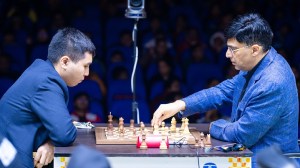145;Discussion with NSG to continue146;
Fresh from the Vienna Nuclear Supplier Group8217;s meet, the US Assistant Secretary of State, Richard Boucher feels that the US still has a lot of ground work to do before the agenda of civilian nuclear cooperation with India could be considered.

Fresh from the Vienna Nuclear Supplier Group8217;s NSG meet, the US Assistant Secretary of State, Richard Boucher feels that the US still has a lot of ground work to do before the agenda of civilian nuclear cooperation with India could be considered.
In an exclusive interview with The Indian Express after his return from the Vienna NSG meet, which critics termed as a failure, Boucher described the talks with the 45-member group as the beginning of a 8216;8216;very serious and constructive8217;8217; discussion.
8216;8216;None of us expected that we would walk in and every body would applaud or say 8216;yes we agree8217;. We were not expecting to convince people in the first meeting,8217;8217; he said. He said a number of countries that are considered to be very strong advocates of non-proliferation raised a series of serious questions pertaining to the deal, which the US would have to answer and explain. These questions ranged from the Non-Proliferation Treaty to India8217;s negotiations with the IAEA. He, however, did not name these countries.
8216;8216;The discussion would have to continue. We have to answer those questions,8217;8217; said Boucher, who is scheduled to arrive in New Delhi next week. 8216;8216;We have to see India make progress in negotiations with the IAEA and as we make progress on our own discussion with India and our own discussion with the US Congress,8217;8217; he said.
8216;8216;They were big picture questions about the NPT and more specific questions about what the timing is vis a vis India8217;s negotiations with IAEA and details of what it is going to be. I think, we are trying to answer those. We tried to answer a lot of them,8217;8217; he said.
Under such circumstances, though unsure, Boucher said he was hopeful that the agenda could still be brought before the NSG preliminary session in Rio de Janeiro in May-end as initially planned by the Bush Administration.
8216;8216;We would keep in touch with NSG countries. I am sure we would be talking to both of them in Vienna and in the capital with their representatives. Whether they would be prepared to finalise this at the next NSG preliminary session in Rio de Janeiro in the end of May I can not say yet, but we are going to continue active discussion and try to see that they are prepared to move it up at that point,8217;8217; Boucher said.
Commenting on the specific provisions of the nuclear legislation that was introduced in the US Congress recently, Boucher said the presidential determination dealt with the factors that have to be present for the civilian nuclear co-operation to start and the condition of a blanket ban on India8217;s nuclear explosion was for the agreement to remain in effect.
The legislative proposal empowers the president to determine that if a set of condition set by the Congress has been met by India. It is only after this that the civilian nuclear deal could be implemented.
The blanket ban on India8217;s nuclear explosion is not included in this presidential determination and comes as a stand alone provision. This means that the agreement with India would automatically become 8220;null and void8221; once India performs a nuclear test after this treaty comes into effect and that the administration or White House would have no role to play. India would have preferred to have this included as part of the presidential determination.
Boucher said: 8220;The presidential determination is one that deals with factors that have to be present for the co-operation to start and the last paragraph imposing restrictions on India8217;s nuclear test is what would make it invalid. So the question is 8216;have you done everything properly to start the co-operation and the last paragraph deals with what would make override on it?8221; he said
Boucher added that it was a little bit of a 8220;past versus future8221; situation and that was the reason why it was addressed differently.
- 01
- 02
- 03
- 04
- 05































